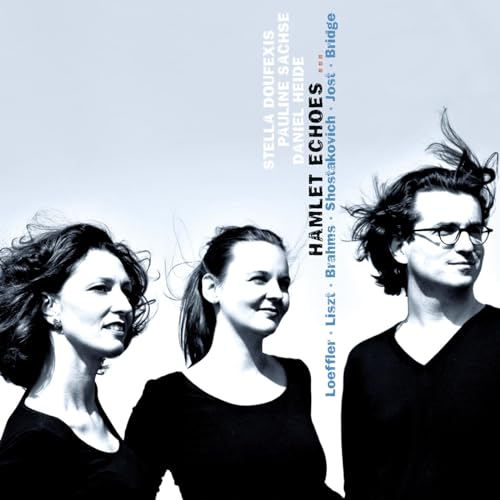
Hamlet Echoes: Songs by Loeffler, Liszt, Brahms, Shostakovich, Jost & Bridge















ÔäŚ┬ę 2011 Deutschlandradio / Deutsche Grammophon GmbH, Berlin
Artist bios
Mezzo-soprano Stella Doufexis was an unusually versatile figure in her native Germany and beyond, singing comic opera, contemporary music, choral music, and lieder with equal enthusiasm and skill. She remained active almost until her early death in 2015.
Doufexis was born on April 15, 1968, in Frankfurt, Germany. Her father was theater director Stavros Doufexis. Stella got her start singing in pop bands as a student. Her mother heard her sing and urged her to take voice lessons. Teachers confirmed her mother's impressions, and she enrolled at the Hochschule der K├╝nste in Berlin, studying with Ingrid Figur. Doufexis took further courses with Dietrich Fischer-Dieskau, Aribert Reimann, and Anna Reynolds. Her debut came in 1995 at the Stadttheater Heidelberg, in the pants role of Cherubino in Mozart's Le nozze di Figaro, where she did so well that she was added to the theater's permanent company. She also made several guest appearances in Spain, Austria, and Belgium as well as Germany in the late 1990s and early 2000s. Doufexis moved to the Komische Oper Berlin in 2005, again becoming part of the company. There she sang not only famous roles in comic opera from Mozart to Richard Strauss but also contemporary music such as the opera Hamlet by Christian Jost, who was her husband. In the 2000s and 2010s, Doufexis increasingly appeared in major opera productions led by top conductors: at the Bavarian State Opera in Munich in new productions of Berlioz's Les Troyens under Zubin Mehta, and Jan├í─Źek's The Cunning Little Vixen under Jun M├Ąrkl, for example.
Doufexis had a large and varied song repertoire in several languages, running from Alessandro Scarlatti to Ravel and Poulenc, and she gave song recitals all over Europe. Her concert appearances included those with such varied ensembles as the Stuttgarter Bach Akademie, the Israel Philharmonic Orchestra, and the Ensemble InterContemporain (under David Robertson). Doufexis made recordings for many major labels, including Berlin Classics, Harmonia Mundi, and Deutsche Grammophon, issuing a reading of Berlioz's Les nuits d'├ętee on Berlin Classics in 2013. The following year, she took a faculty position at the Robert Schumann University in D├╝sseldorf, but she died on December 15, 2015, in Berlin after a long battle with cancer. Recordings she made before her death continued to appear, including one, for Deutsche Grammophon, of parallel settings of the Dichterliebe cycle by Schumann and Jost, and in 2019, a recording of orchestral songs by Joseph Marx. ~ James Manheim
Pianist Daniel Heide specializes in collaborative playing but has also performed and recorded as a soloist. He is the founder of the concert series Der lyrische Salon -- Liederabende auf Schloss Ettersburg.
Heide was born in Weimar, then in East Germany, in 1976. He took up the piano at age five, with his first lessons coming from his mother, a pianist and singer. A year later, he enrolled at the Musikgymnasium Schloss Belvedere, a Weimar music school for gifted music students; there, he studied with Sigrid Lehmstedt. For a time, he abandoned music in favor of percussion lessons and competitive cycling, but at 17, he returned to his keyboard studies, enrolling at Franz Liszt University in Weimar. He studied there with Ludwig B├Ątzel but also directed much of his own education, attending song master classes with the likes of Dietrich Fischer-Dieskau and Christa Ludwig, and getting valuable guidance from them. Heide would go on to focus on collaborative pianism in his performing and recording career. He made his recording debut in 2009 on the Ars Produktion label, backing violist Pauline Sachse on the album Viola Tales.
Heide has appeared as an accompanist in many European countries, in such prestigious venues as the Philharmonie in Berlin, Wigmore Hall in London, and the Prinzregententheater in Munich. His services are in heavy demand among both singers and instrumentalists. Heide works frequently with the mezzo-soprano Stella Doufexis, and among his other regular vocal collaborators are mezzo-soprano Ingeborg Danz and contralto Britta Schwarz. He has also accompanied the likes of Christoph Pregardien, Simone Kermes, and Luca Pisaroni, among others, in lieder recitals. Heide's instrumentalist collaborators include violist Tabea Zimmermann, violinist Antje Weithaas, and cellist Wolfgang Emanuel Schmidt. In 2011, Heide founded the concert series Der lyrische Salon -- Liederabende auf Schloss Ettersburg at a castle outside Weimar; the art song event has been repeated monthly ever since and has attracted growing crowds of young people. He is also active as a solo pianist and has issued several recordings of Beethoven sonatas on the CAvi-music label. Many of his collaborative recordings have also appeared on that label, but in 2022, he moved to Deutsche Grammophon, backing baritone Andr├Ę Schuen on a recording of Schubert's song cycle Schwanengesang, D. 957. ~ James Manheim
Language of performance
EnglishCustomer reviews
How are ratings calculated?

